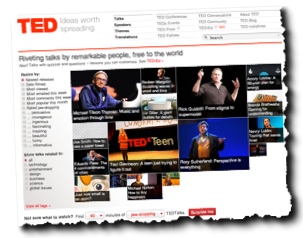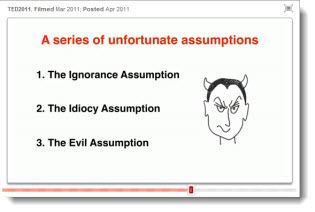I’ve watched dozens of TED talks online and never seen a bad one.
TED stands for Technology, Education, and Design. It started in 1984. Since 1990 it was located in a conference center outside of Monterrey CA. Since 2001 it’s been curated mainly by Chris Anderson.
Most TED conferences were amazing. I’ve never been, but what I’ve seen is a collection of excellent presentations about compelling ideas and information delivered by the best and the brightest in the world. If you’ve been reading this blog you’ve seen TED talks off and on. Since I first discovered the online TED talks at TED.com I’ve been back to that well regularly. And what I’ve found has been consistent highest quality of thought, communication, and, specifically, presentations.
For more than a dozen of my favorites, from previous posts on this blog, use this link.
So far, so good. Can anybody blame TED for wanting to branch out and expand? Not me. TED is now branching out to TEDx talks that are way less exclusive. Look around for TEDx on the web and you’ll see the TEDx talks popping up everywhere. Here’s what TED says about TEDx:
Created in the spirit of TED’s mission, “ideas worth spreading,” the TEDx program is designed to give communities, organizations and individuals the opportunity to stimulate dialogue through TED-like experiences at the local level. TEDx events are fully planned and coordinated independently, on a community-by-community basis.
In theory that’s great, but what if the end result is that TED talk no longer means guarantee of high quality? I hope the TED tradition continues. But here’s the concern I have: Does that mean dilution of quality? A lower bar? More people presenting to more people on more subjects in many more locations?
TED says that 231 TEDx conferences were held last month.
And meanwhile, just to make that a bit more real, this morning I clicked a TEDx link in my email to end up with this disappointing result:



You must be logged in to post a comment.